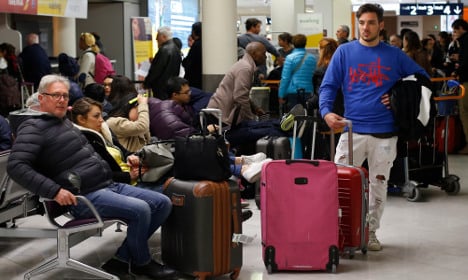Some 30,000 passengers were affected Thursday on the second day of a week-long strike by Air France flight crew with the cancellation of one in five flights, a company spokesman said.
The disruption was slightly greater than on Wednesday and it looks like a similar number of people will be affected on Friday.
The airline said it would operate more than 80 percent of its flights on Friday.
Around 15 percent of internal flights would be grounded, 25 percent of medium haul flights around Europe and North Africa, and 10 percent of long haul services.
At Charles de Gaulle airport in Paris some 139 medium and long haul flights were affected on Friday.
Passengers are advised to check the status of their flights first before travelling to the airport, but the airline has also warned of last minute cancellations and having to limit the number of passengers per flight.
Normally passengers receive an email or a text alerting them to cancellations.
On Thursday some 163 flights out of 516 were cancelled according to unconfirmed reports. At Orly airport 59 out of 171 Air France flights were grounded.
The new CEO of the Air France-KLM group, Jean-Marc Janaillac, said in an interview with the daily Le Figaro that the strike was “regrettable and aggressive”, coming at the height of the holiday travel period.
Air France flights operated by low-cost airlines HOP! and Transavia, as well as KLM and Delta codeshares, were not affected by the stoppage.
Unions noted that the strike would have its most serious effects at the weekend, when July holiday-makers return home and their August cohorts start their vacations.
Unions representing around half of the strikers last Friday said the stoppage would go ahead as marathon talks failed to reach a breakthrough on renewing a collective labour accord on rules, pay and promotions that expires in October.
Management want to limit the extension of the agreement to 17 months, whereas unions want between three and five years.
Flights to destinations in Europe, north Africa and Israel will be affected, as well as some routes in Asia and Africa, the company said Monday.
In late June, Janaillac warded off a pilots' strike that would have been the second such stoppage during the Euro football tournament.
The pilots' last strike, which grounded around 20 percent of flights on June 11-14, hit France as it was gripped by social unrest over the Socialist government's labour reforms.
Air France estimated that stoppage cost it some €40 million ($45 million).



 Please whitelist us to continue reading.
Please whitelist us to continue reading.
Member comments